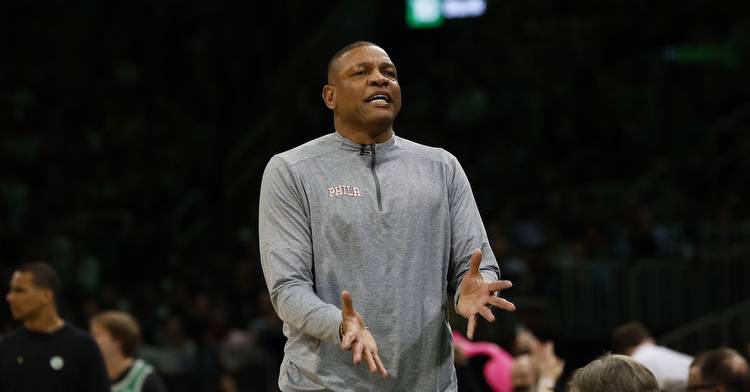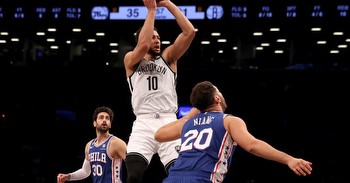Former Sixers coach Doc Rivers talks about challenge of coaching James Harden, what he believes Joel Embiid needs to do

Doc Rivers, now the former head coach of the Sixers, made his first media appearance since being dismissed. He was a guest on Bill Simmons’ podcast that dropped Tuesday. The latest episode dives into the Nuggets’ title run and Doc’s final year in Philly.
I’m willing to bet that most Liberty Ballers readers don’t want to listen to much of Bill Simmons or about the Nuggets, so I sacrificed a part of my soul to bring you the important quotes from Doc on the Sixers.
If you want to skip the Nuggets talk, skip to about 51 minutes into the episode. Bill Simmons’ first question was what does Joel Embiid need to do to win a title:
“No. 1 he needs to be healthy in the playoffs. [This year] was the healthiest, but he still wasn't 100 percent. And No. 2, for Jo, he’s got to make all of his players better in the playoffs.
And his numbers are unfair. If you look at his numbers during the last three years in the playoffs compared to the regular season numbers, they’re not very good. A lot of that is due [to injuries]. The first year I had him, he hurts his knee. The next year he gets hit in the face, he tears a ligament in his hand. And this year he has a knee injury — and he was never the same when he came back this year. So health is No. 1.
The second thing, and he has the ability [to make others better], Bill. I stayed on him daily. He has the ability to make his teammates better. And when he does that, and if you look at our games when he did that and dominated, [it’s hard] to go away from Joel Embiid. It really is. He just has to do that on a consistent basis, not just on the court, but also off the court. Just be around your guys, spend time with your guys, and let them know you love them — cause they love you.”
Rivers went on to mention how Embiid sitting out his first few years set a tone, where he got used to not playing in games.
“Fighting that [tone], when I first got there was huge. ‘Jo, you need to play tonight.’ ‘Jo, you can play tonight’. Now he’s up in games. He’s crossed that barrier. The next one will be making his teammates better. When he does that, he’ll be hard to stop. I think he will do it. I think we just forget his age, and how he started in the league.”
Bill Simmons went on to ask about the Process, the culture there and the ‘scars’ left behind from losing games. Whether it was still felt in the organization today and if Doc felt them coaching the team:
“Yeah. You can feel it all through the organization. Elton [Brand], when he brought me in, that’s what he told me. ‘Hey, this is not just about coaching this team. We’re bringing you in here to change the culture’. And he meant everywhere.
He allowed me to come in, and we looked through the entire organization — trainers, equipment managers, everybody. If you’re not on board, if you’re not trying to win, and that’s not what you’re breathing everyday, it’s time to go. I meant that with everybody in the organization”.
Overall, I thought we were starting to get it done. You could see the change in the culture. I think the growth of that is there, and I think there’s growth [to be made] in that department as well. [It was] very media alert, is the word I’m using, and sometimes you can’t worry about that. You just have to worry about the basketball part of it.
But their culture has definitely gotten better, and I had a big part in that. The growth from there still has to get better and if that happens they have a chance. If it doesn’t happen, Bill, they’re not going to win. It has to keep growing”.
After some talk on the Celtics series and early 2000s basketball, the conversation eventually shifted to coaching James Harden. Simmons asked Doc what’s missing from Harden to make him a ‘postseason guy’:
“I don’t think anything is missing, Bill. What makes James great is he’s one of the best individual players to ever play the game. [He handles the ball, dribbles, attacks well]. But that also allows you to attack him, you know where he’s at, you know where’s the ball is at. In the playoffs, when teams are game planning against you each game — double teaming, taking the ball out of your hand, making it harder — it’s easier to do that to James compared to someone like Steph [Curry].
Rivers brought up the Clippers-Golden State series in the past and how Steve Kerr used Curry’s off-ball movement to get him open shots and to make things difficult on the Clippers defense.
I think [the lack of off ball movement] is James’ kryptonite right now. But I don’t believe the whole thing that he quits. I just think teams make him struggle cause they know where he’s at [on the court], and how it’s easier to find him.
Bill Simmons asked Doc how he felt coaching Harden and whether or not he enjoyed it:
“It was challenging. More because we were fighting two things, and not like visually fighting. James was so good at playing one way, and the way I believe you have to play to win, in some ways is different because it’s a lot of giving up the ball, moving the ball and coming back to the ball.
I would’ve loved to have [James] when he was younger, when that was easier for him. Cause giving up the ball and coming back to it is hard, it’s physical and it’s exhausting. It would’ve been interesting if I had him when he was younger [so we could do more of that].
At times, to get him to move and play the way I needed him to play [was challenging], I thought the first half of the year we were the best team in the game. I thought James was playing perfect basketball, he was a point guard of the team, he was still scoring, but he was doing more playmaking and scoring. And then the second half he started scoring more, and I thought we got more stagnant at times.”
The final question Bill Simmons asked was what player would you want next to Embiid and Tyrese Maxey — assuming Harden isn’t a part of the equation. Rivers responded with an alpha, such as Jimmy Butler, for a locker room presence. On the court, he alluded to a “big point guard who can score” such as a Manu Ginóbili. He compared Maxey to Tony Parker and how Ginóbili allowed him to “be free” at times.
If you want to listen to the episode, check it out here.




































